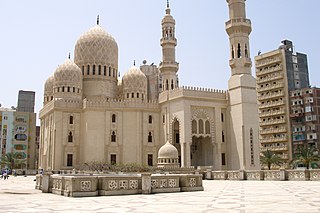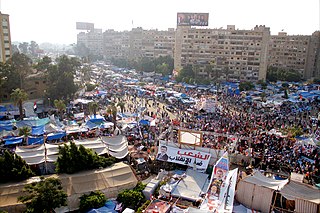Mursi may refer to:
Mursi may refer to:
Mursi is an Arabic nisba meaning "from Murcia". It may refer to:
Abd Allah, also spelled Abdallah, Abdellah, Abdollah, Abdullah, Abdulla, Abdalla and many others, is an Arabic name meaning "Servant of God". It is built from the Arabic words ʻabd (عبد) and Allāh (الله). Although the first letter "a" in Allāh, as the first letter of the article al-, is usually unstressed in Arabic, it is usually stressed in the pronunciation of this name. The variants Abdollah and Abdullah represent the elision of this "a" following the "u" of the Classical Arabic nominative case. Abd Allah is one of many Arabic theophoric names, meaning servant of God. God's Follower is also a meaning of this name.
Abū al-ʿAbbās is an Arabic name that may refer to:

Ali Gomaa is an Egyptian Islamic scholar, jurist, and public figure who has taken a number of controversial political stances. He specializes in Islamic Legal Theory. He follows the Shafi`i school of Islamic jurisprudence and the Ash'ari school of tenets of faith. Gomaa is a Sufi.

The Abu al-Abbas al-Mursi Mosque is an Egyptian mosque in the city of Alexandria. The historic mosque is named after the 13th century mystic Abu'l Abbas al-Mursi, who is also buried in the same place along with members of the Ashraf family.
Al-Mursi Abu'l-'Abbas was a saint from Al-Andalus during the Nasrid period and who later in his life moved to Alexandria in Egypt. His complete name is Shahab al-Din Abu'l-'Abbas Ahmad ibn 'Umar ibn Mohammad al-Ansari al-Mursi. Al-Mursi Abul-'Abbas, as he is now commonly called, is one of the four master saints of Egypt, the other three being Ahmad al-Badawi, al-Dessouqi and al-Haggag. His legacy and reverence in Egypt were such that Mursi became a common name in the country.

Presidential elections were held in Egypt in 2012, with the first round on 23 and 24 May 2012 and the second on 16 and 17 June. They were the first democratic presidential elections in Egyptian history. The Muslim Brotherhood declared early 18 June 2012, that its candidate, Mohamed Morsi, won Egypt's presidential election, which would be the first victory of an Islamist as head of state in the Arab world. It was the second presidential election in Egypt's history with more than one candidate, following the 2005 election, and the first presidential election after the 2011 Egyptian revolution which ousted president Hosni Mubarak, during the Arab Spring. However, Morsi's presidency was brief and short-lived, and he later faced massive protests for and against his rule, only to be ousted in a military coup in July that year.

Mohamed Mohamed Morsi Eissa al-Ayyat was an Egyptian politician, engineer, and professor who served as the fifth president of Egypt, from 2012 to 2013, when General Abdel Fattah el-Sisi removed him from office in a coup d'état after protests in June. An Islamist affiliated with the Muslim Brotherhood organization, Morsi led the Freedom and Justice Party from 2011 to 2012.

The Islamic Party is an Islamist political party in Egypt. The name of the party was changed in approximately December 2012. The main leaders of the group are Mohamed Abu Samra and Kamal Habib. The party is backed by the Egyptian Islamic Jihad group. Most of the founders of the party are former members of the organization. Many members of the party have court rulings that bar them from running for elected office.

The following is a chronological summary of the major events that occurred after the Egyptian Revolution of 2011, after Mohamed Morsi's election as the fifth President of Egypt, on 30 June 2012. This article documents the third wave of the Egyptian Crisis.

The 2012–2013 Egyptian protests were part of the crisis in Egypt including the June 2013 protests, the July 2013 coup d'état, and part of the post-coup unrest. They saw varying opposition against three contiguous heads of state; namely, the Supreme Council of the Armed Forces (SCAF), Muslim Brotherhood, and the de facto ruling Egyptian Armed Forces.

Tamarod was an Egyptian grassroots movement that was founded to register opposition to President Mohamed Morsi and force him to call early presidential elections. The goal was to collect 15 million signatures by 30 June 2013, the one-year anniversary of Morsi's inauguration. On 29 June 2013 the movement claimed to have collected more than 22 million signatures (22,134,460). A counter campaign was launched in support of Morsi's presidency which claimed to have collected 11 million signatures. The movement was planning to become a political party following the 2014 Egyptian presidential election.

The Anti-Coup Alliance is a coalition in Egypt formed to reverse the ouster of former president Mohamed Morsi. The coalition is made up of approximately 40 Islamist parties and groups.

The 2013 Egyptian coup d'etat took place on 3 July 2013. Egyptian army chief General Abdel Fattah el-Sisi led a coalition to remove the democratically elected President of Egypt Mohamed Morsi from power and suspended the Egyptian constitution of 2012. The move came after the military's ultimatum for the government to "resolve its differences" with protesters during widespread national protests. The military arrested Morsi and Muslim Brotherhood leaders, and declared Chief Justice of the Supreme Constitutional Court Adly Mansour as the interim president of Egypt. The announcement was followed by demonstrations and clashes between supporters and opponents of the move throughout Egypt.

Adly Mahmoud Mansour is an Egyptian judge and politician who served as the president of the Supreme Constitutional Court of Egypt. He also served as interim president of Egypt from 4 July 2013 to 8 June 2014 following the 2013 Egyptian coup d'état by the military which deposed President Mohamed Morsi. Several secular and religious figures, such as the Grand Imam of al-Azhar, the Coptic Pope, and Mohamed ElBaradei supported the coup against President Morsi and the military appointed Mansour interim-president until an election could take place. Morsi refused to acknowledge his removal as valid and continued to maintain that only he could be considered the legitimate President of Egypt. Mansour was sworn into office in front of the Supreme Constitutional Court on 4 July 2013.

The 30 June revolution occurred in Egypt on 30 June 2013, marking the one-year anniversary of Mohamed Morsi's inauguration as president. The events ended with the 2013 Egyptian coup d'état after mass protests across Egypt demanding the immediate resignation of the president. The rallies were partly a response to Tamarod, an ostensibly grassroots movement that launched a petition in April 2013, calling for Morsi and his government to step down. Tamarod claimed to have collected more than 22 million signatures for their petition by June 30, although this figure was not verified by independent sources. A counter-campaign in support of Morsi's presidency, named Tagarod, claimed to have collected 26 million signatures by the same date, but this figure was also unverified and not mentioned in media nearly as much as Tamarod's, with no reliable sources repeating it. The movements in opposition to Morsi culminated in the June 30 protests that occurred across the country. According to the Egyptian military, which calculated the number of protesters via helicopter scans of demonstration perimeters across the country, the June 30 protests had 32 million protesters, making them "the biggest protests in Egypt's history." However, independent observers raised concerns that the Egyptian government exaggerated the actual number of anti-Morsi protestors, with some research determining that only around one to two million people protested across the country against Morsi.

Protests against the 2013 Egyptian coup d'état erupted in July 2013. Immediately following the removal of President Mohamed Morsi by the Egyptian Armed Forces on 3 July 2013 amid demonstrations against Morsi's rule, many protesters amassed near the Rabia Al-Adawiya Mosque to call for Morsi's return to power and condemn the military, while others demonstrated in support of the military and interim government. Deadly clashes such as Rabaa massacre continued for several days, with three particularly bloody incidents being described by officials as "massacres" perpetrated by security forces. During the month of Ramadan, prime minister Hazem al-Beblawy threatened to disperse the ongoing Pro-Morsi sit-ins in Rabaa al-Adaweya square and al-Nahda square. The government crackdown of these protests occurred in a violent dispersal on 14 August 2013. In mid-August, the violence directed by the army towards the protesters escalated, with hundreds killed, and the government declaring a month-long nighttime curfew.
Mahmoud Badr is an Egyptian activist and journalist. He co-founded the Tamarod ("Rebel") movement and serves as its official spokesman and one of its principal leaders. Tamarod claimed to have gathered millions of signatures, that were never independently verified, demanding the resignation of Egyptian president Mohamed Morsi, and organized mass protests which preceded the 2013 Egyptian coup d'état removing Morsi from power. Recent audio tapes secretly recorded in the offices of the deputy ministers to Al-Sisi – and authenticated by independent expert analysis from France – establish the movement as an arm of the military coup. Senior officials of the coup are heard on the tapes bragging about how good they were at falsifying evidence against Morsi, at forgery and at torture. The list of plotters included Deputy Defense Minister Mamdouh Shaheen and Gen. Abbas Kamel, the chief of staff to Gen. Abdel Fattah el-Sisi, the top military commander regarded as the mastermind behind the coup.
Events in the year 2019 in Egypt.

Mario Rossi (1897-1961) was an Italian architect and notable contributor to 20th-century Islamic architecture.